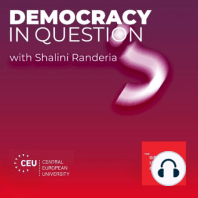30 min listen

Can and should Western style democracy be exported far and wide?
Can and should Western style democracy be exported far and wide?
ratings:
Length:
26 minutes
Released:
Oct 22, 2020
Format:
Podcast episode
Description
The world is more formally democratic than ever before, if measured by the number of countries that have a representative form of government. But how viable is the Western model of liberal democracy as it travels to, and is transplanted in, different countries around the world? In this episode Professor Laurence Whitehead (Oxford University) and Dr. Yanina Welp (Albert Hirschman Centre on Democracy, Graduate Institute, Geneva) examine these issues against the background of the trajectories of Latin America’s turbulent experiences with democracy and populism. Show Notes Learn more about: • Our guest Yanina Welp • Our guest Laurence Whitehead • Our host Shalini Randeria The Democracy in Question Podcast is brought to you by: • The Institute for Human Sciences in Vienna: IWM • The Albert Hirschman Centre on Democracy in Geneva: AHCD • The Excellence Chair and Soft Authoritarianism Research Group in Bremen: WOC • The Podcast Production Company Earshot Strategies Follow us on Social Media! Institute for Human Sciences in Vienna: @IWM_Vienna Albert Hirschman Centre on Democracy in Geneva: @AHDCentre Follow Yanina Welp on Social Media: @Welpita Subscribe & Support! If you enjoyed what you listened to, you can support us by leaving a review and sharing our podcast in your networks! Bibliography • Check out Yanina’s and Laurence’s new book: The Politics of Recall Elections • Whitehead, Laurence. (2010). Biology, Politics, and Democracy. Taiwan Journal of Democracy, 6(2). • Whitehead, Laurence. (2019).Temporal Models of Political Development: In General and of Democratization in Particular. In Democracy under Threat (pp. 23-44). Palgrave Macmillan, Cham. Glossary What is modernization theory?(00:02:30 or p. 2 in the transcript) A central claim of modernization theory is that economic development, cultural change, and political change go together in coherent, and to some extent, predictable patterns. Once a society starts to industrialize, according to modernization theory, a variety of related changes become almost inevitable, such as urbanization and bureaucratization (explained below), and eventually, changing gender roles. […] The classic versions of modernization theory were deterministic, with the Marxist version tending toward economic determinism, and the Weberian version sometimes tending toward cultural determinism.Source: Ronald Inglehart, in International Encyclopedia of the Social & Behavioral Sciences , 2001. Click here to learn more. What is bureaucratization? German sociologist Max Weber (1864-1920) argued that the growth of the population being administered, the growth in complexity of the administrative tasks being carried out, and the existence of a monetary economy requiring a more efficient administrative system were all preconditions for the emergence of bureaucracy in modern societies. As a result of the development of communication and transportation technologies, a more efficient administration became not only possible but demanded by the public. Weber argued that this shift was accompanied by an increasing democratization and rationalization of culture and that this resulted in public demands for a new administrative system that treated all humans equally. Learn more. What happened in 1949? (00:04:00 or p. 3 in the transcript) In 1949 The Federal Republic of Germany (popularly known as West Germany) was formally established as a separate nation, which marked the effective end to any discussion of reuniting East and West Germany. When did Evo Morales become president of Bolivia? (00:09:00 or p. 6 in the transcript) Evo Morales served as the President of Bolivia from 2006 to 2019. He was Bolivia’s longest-serving president and its first indigenous president. In 2019 he announced his resignation after weeks of intense protests sparked by a dispute over the results of the October 20 election. Learn more. What is partitocrazia? (00:10:30 or p. 7 in the transcript) Partitocrazia, also kn
Released:
Oct 22, 2020
Format:
Podcast episode
Titles in the series (77)
What keeps democracies alive? by Democracy in Question?